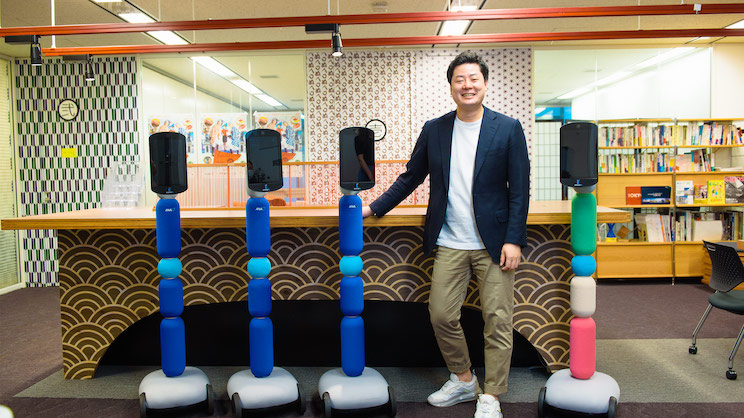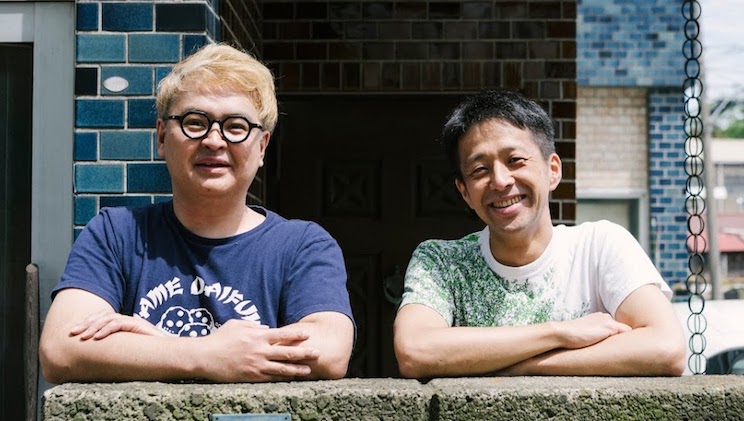Transforming Japan with Blockchain: The Challenges LayerX Faces With a “Straightforward Approach”
Transforming Japan with Blockchain: The Challenges LayerX Faces With a “Straightforward Approach”

With “digitalize all economic activity” as its mission statement, LayerX is a company focused on blockchain technologies. Headquartered in Higashi-Nihonbashi, the downtown area of the city, the company has been in the spotlight for the past few years. Hopes are high for the startup - which has an office in the same Nihonbashi that serves as a financial hub for countless banks and securities firms – just two years after its founding, and the company has already brought a number of collaborative efforts to fruition in partnership with leading companies. Blockchain often comes up when the topic of virtual currency is discussed in Japan, and for this issue we spoke with LayerX executive officer and HR/PR Department director Mr. Takaya Ishiguro about how the company aims to transform Japanese society with this technology, as well as the company’s business, the potential of blockchain as a technology, and their reasons for maintaining an office in Nihonbashi.
Promoting digitalization of Japanese companies
-First, could you tell us about how you came to join LayerX, Mr. Ishiguro?
I joined NTT DoCoMo when I first graduated, then eventually moved on to managing the HR department at Mercari before joining up with LayerX in May 2020. I’ve always been intrigued by how technology changes the world, in my jobs, and in retrospect the 2010s were the era when “toC” (to consumer) services matured – like Mercari’s smartphone app, among others. At the same time, I felt like “toB” enterprise businesses would be the long-term growth sector in Japan going forward, since digitalization or what we now call digital transformation (“DX”) struggled in Japan. I knew LayerX’s CEO, Mr. Yoshinori Fukushima, at that point, and as we spoke it eventually worked out for me to join LayerX.
-Were you always interested in blockchain, as the core of LayerX’s business?
Yes, I was. Blockchain is already in use in a variety of settings in China and the US and so on. Meanwhile, in Japan it still has an image of being virtual currency, and you couldn’t say it’s a part of everyday life. However, I felt it would be a vital technology in the coming era. I think LayerX’s mission will be quite challenging, as we work to redirect society in a positive direction using that technology for enterprise business.

Mr. Takaya Ishiguro, an executive officer of LayerX who joined us for this interview
-So the mission statement for LayerX is to “digitalize all economic activity”?
Yes. LayerX originally sprang from a new business development lab at Gunosy, a company that Mr. Fukushima launched. Gunosy went on to transform the media sector by streaming news using a technology called machine learning. I’ve heard that they settled on blockchain when searching for upcoming new technologies with the same impact. Mr. Fukushima became the representative in 2019 and held an MBO, and it’s now an organization of about 30 people. We aim to promote the digitalization of economic activity while providing the right technologies and solutions for it, instead of just aiming to use blockchain technologies.
-Could you tell us about some projects more specifically?
Blockchain and DX are the two business pillars at LayerX. For the former, we engage in joint research with universities and experimental trials with governments and other companies under socially practical applications for blockchain technologies. For the latter, we promote staged corporate DX through consulting, outsourced development, and launches of joint ventures.
What sort of technology is blockchain?
-I feel like blockchain hasn’t really been absorbed well yet in Japan.
It’s about as hard to explain blockchain technologies as explaining “what is the Internet?” from a technical standpoint, and the first question is how deeply you need to understand it. For example, nobody is really aware of the technologies behind the scenes of the LINE messenger app so many people use. I feel like someday, people will use blockchain without even thinking about what sort of technologies are involved in it.
-Is it like that already in China and the US?
It’s close in China, in particular. They’re likely to use blockchain technologies in the digital currency the People’s Bank of China aims to issue, and it’s also used in the securities and insurance sectors. The ability to prove “transfer of value” is the true essence of blockchain, and there are now a huge number of usage cases in the financial sector, not just in China.

Image provided by:LayerX
-What does it mean to have the “ability to prove ‘transfer of value’?”
Blockchain technologies are as the name says: distributed ledgers where transaction records are written and stored in a chain of blocks. This allows for efficient management of past transactions, and the history is traceable, which makes it hard to tamper with. It makes more sense if you remember checking out books from the elementary school library as a kid, since each book had its own card with the names of people who had borrowed it in the past. You could tell who had borrowed the book and how many people total had, but you could also tamper with the record by rewriting it. Meanwhile, blockchain’s structure makes tampering difficult, which proves there are no errors in the borrowing history, and it’s unique in that you can ensure data privacy by pairing it with encryption technology. Since blockchain technologies let you trace the transfer of ownership, they’re sometimes adopted for land and used vehicle buying and selling, and for contract management. There have also been cases where they were used for the logistics sector, for food traceability and so forth.
-There are cases where blockchain is creating a new form of credit, aren’t there?
At LayerX, changing the structure of credit and assessments with this technology is precisely what we want to do. For example, a lot of corporate business is built on “trust” and “human operations,” but since there are more concerned parties the more complicated the industry’s interrelations are, sometimes “supervision” is required. We can reduce the costs of record management and supervision by digitalizing those processes via blockchain technologies, and ensuring the transfer of value.
In order to gain the “trust” of legacy companies
-So LayerX aims to encourage corporate DX using blockchain technologies, does it?
Yes. But there’s a lot we consider before getting to use of blockchain. We see corporate digitalization as having four phases, and we support staged DX. First, level one is “digitalization of tools,” which involves throwing out the paper and stamps, and moving to the cloud and so on. Level two is “digitalization of duties,” and involves centralizing data management through API connections and similar things. Level three is “advancement of duties,” and it promotes automated ordering and payment using advanced machine learning. Finally, level four is “collaboration,” where blockchain first makes an appearance. We see it as involving sharing of ordering and receiving across companies, supply chain management, and expansion and automation of the financing process.
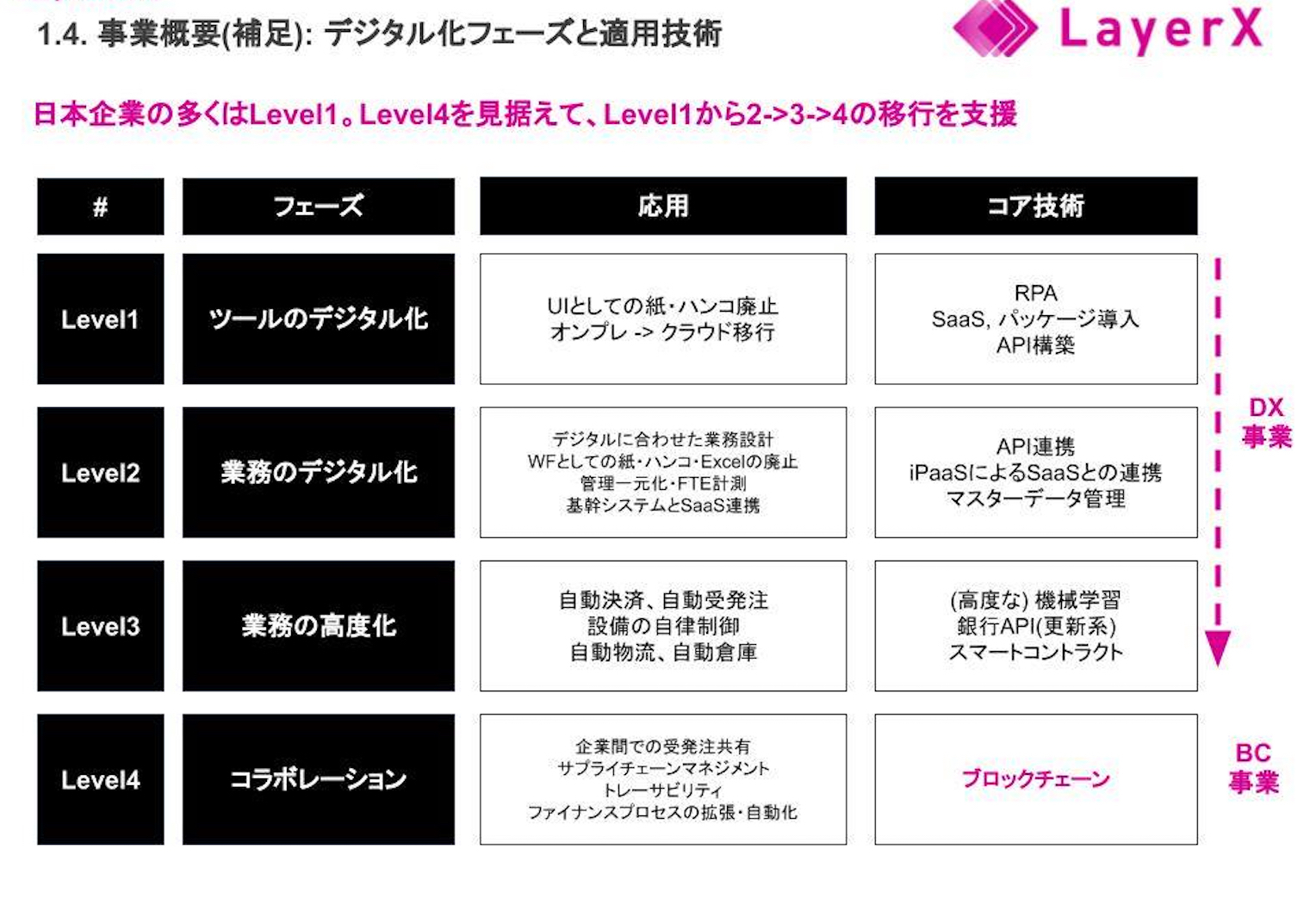
Image provided by:LayerX
-The coronavirus pandemic unexpectedly revealed that many Japanese companies are still at level one. Given that they’ve operated based on valuing “trust” and “human operations,” it seems like there is a high psychological bar to clear in getting them to adopt the new forms of trust and assessment that blockchain offers, as a technology.
All the same, I feel there are a lot of people in management with a mindset that says “we have to change.” Broadcasting is very important in building up “trust,” just as you’d expect, for something that’s relevant to the PR I’m in charge of. For example, at LayerX we use a newsletter to broadcast reports on blockchain use cases and comparisons of technical infrastructure. We use that to increase literacy in the technologies we have as a company, and to reduce decision-making costs for technology selection.
-So you definitely value it as a corporate activity that gains you “trust”?
Exactly. I feel we’re lucky at LayerX just to have worked with Mitsui & Co. and MUFG over just two years since our founding, but it’s hard for us to access the kind of assets they’ve built up over 50 years or a century, overnight. The significance of our existence only really appears when we collaborate in a useful way like that. That’s why we consider it important to help people understand our strengths, learn about how to use our technologies, and for us to show the potential for collaboration via the reports I mentioned earlier.

The reason to have an office in Nihonbashi
-On that point, may I ask why you decided to place your office in Nihonbashi, which has quite a few companies with long histories?
Hypothetically, if we had located our office in Roppongi or Shibuya where there are a lot of startups, I think we would’ve needed to commit a lot of the external capital we got from investors into office expenses. Our representative Mr. Fukushima’s policy is to invest in people and business instead of offices, so we ended up placing our office in Higashi-Nihonbashi – where the rents are more affordable than the areas you just mentioned. Also, the Nihonbashi area has a lot of financial firms that are quite compatible with blockchain technologies, and it’s quite convenient. We think that startups like us should transform economic activity in partnership with companies with tradition, and with major industries. In that sense, we felt it was very significant to choose the location for our office, and while we had no basis for it, we felt that startups would cluster here like they did in the “Downtown Valley.”
-How do you feel about the city, now that you actually work here?
There are a lot of bars and restaurants and a lot of variety, so lunch is always great (laughter). Also, this is my personal opinion, but a lot of businesses in the Nihonbashi neighborhood don’t support cashless transactions. And one time I went out to get lunch and realized I didn’t have any cash on me, but the restaurant owner told me that “tomorrow is fine.” I really appreciate that sort of human kindness. We work to advance productivity and rationality using technology, but everyone always appreciates that side of humanity. It really reminded me that I want to make progress with business efficiency improvements, in order to let people spend more time on that sort of genuine, human activity.
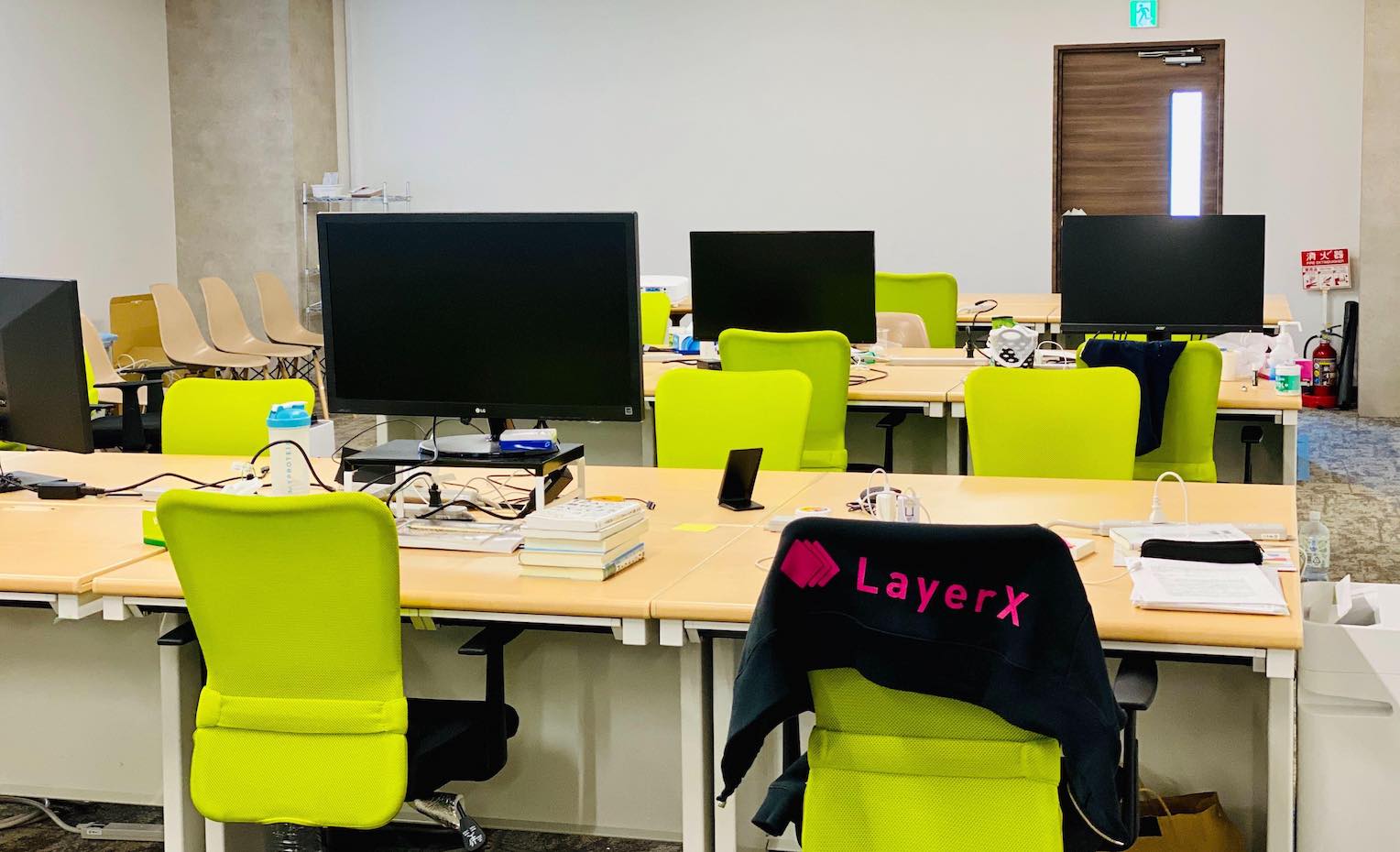
Image provided by:LayerX
-Nihonbashi has always been a city that broadcasts authentic value. At LayerX, we have high hopes for spreading blockchain as a new technical standard throughout society from this sort of place.
Our representative, Mr. Fukushima, has spoken about our desire to digitalize industry with a focus on blockchain, over the next 10-20 years. Also, it’s important to take the straightforward path when you set out on a long journey. At LayerX, we aim to forge a new, straightforward path and face the challenges of Internet x Enterprise, and Software x Physical Industry head on.
Society as transformed by blockchain
-Could you please also tell us about “digital currency and payment,” one of the key themes at LayerX Labs – which you launched recently?
With a central bank considering future use of digital currency, advanced technologies will be vital for security. It would be significant to use blockchain for that technology, in that sense, and I also think we would like to be involved, at LayerX.
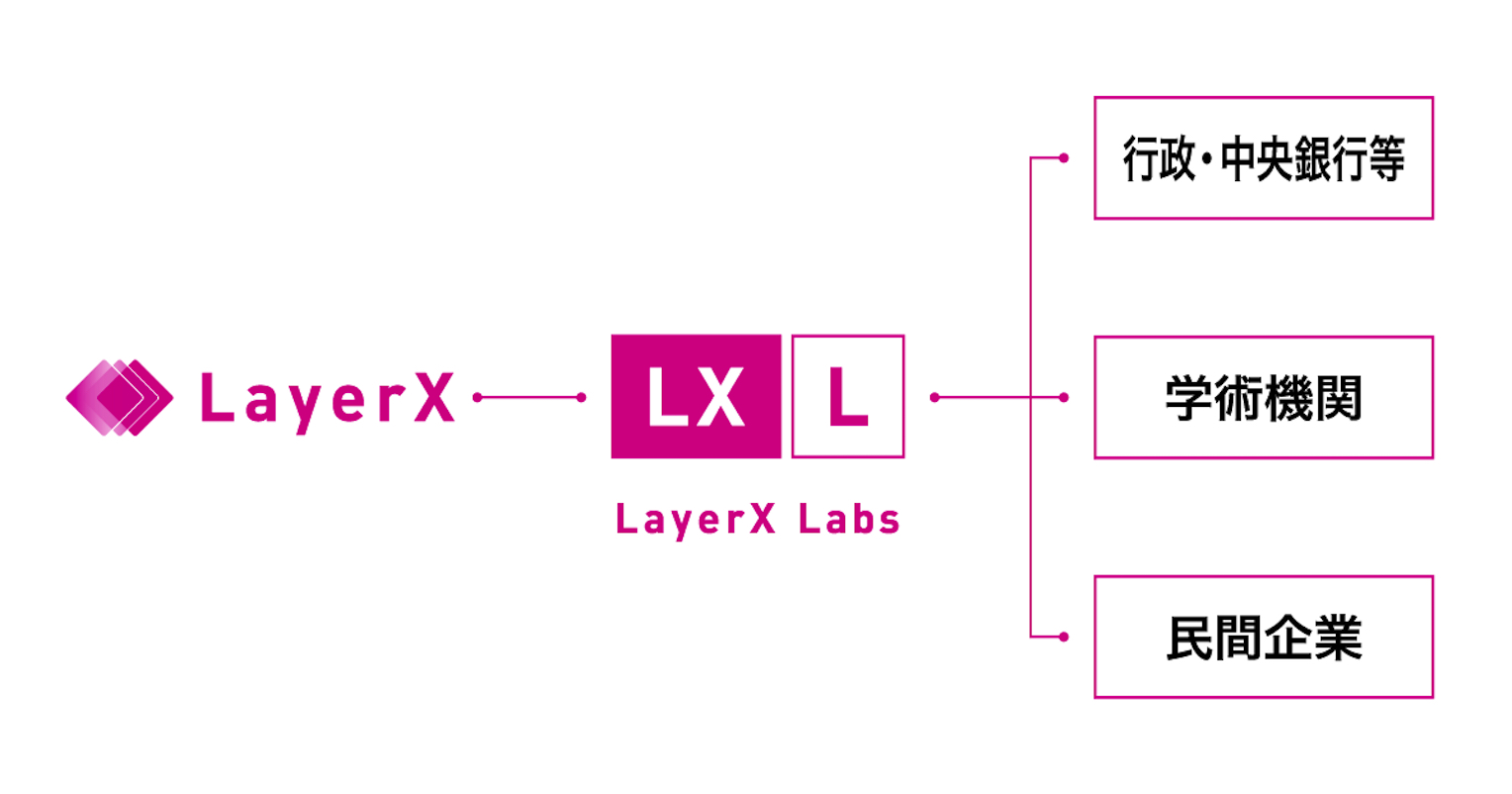
Image provided by:LayerX
-What about “Smart Cities,” another key theme at LayerX Labs?
I think a lot of people envision automated driving and shopping via facial recognition when they hear the term “smart city,” but what we’re talking about is digitalization across organizations and services. LayerX Labs director Ryuya Nakamura often calls it “a system on top of a system,” but for example, it really would be handy to centralize procedures for income tax filings and hometown taxes, since they’re both tax-related. Our mission at LayerX Labs is to dig into key points for making society run more smoothly through joint research with academic and research institutions, on things like prototyping a “system on top of a system” using blockchain.
-So the smart cities LayerX envisions have blockchain merged into society and the city like the atmosphere, where people are unaware of them yet living a more convenient, smoother lifestyle. Would that be the future of Japanese society?
Yes. There are a lot of approaches to using blockchain for digitalization up to corporate DX, drawing from the smart cities and digital currency I mentioned earlier. I want us to properly show our strengths and solutions for problems, then stand by our customers up through execution. Rather than pushing sales of blockchain in the future, we want to use technology to continue to improve productivity across Japan, and also improve on the daily inefficiencies that everyone senses.
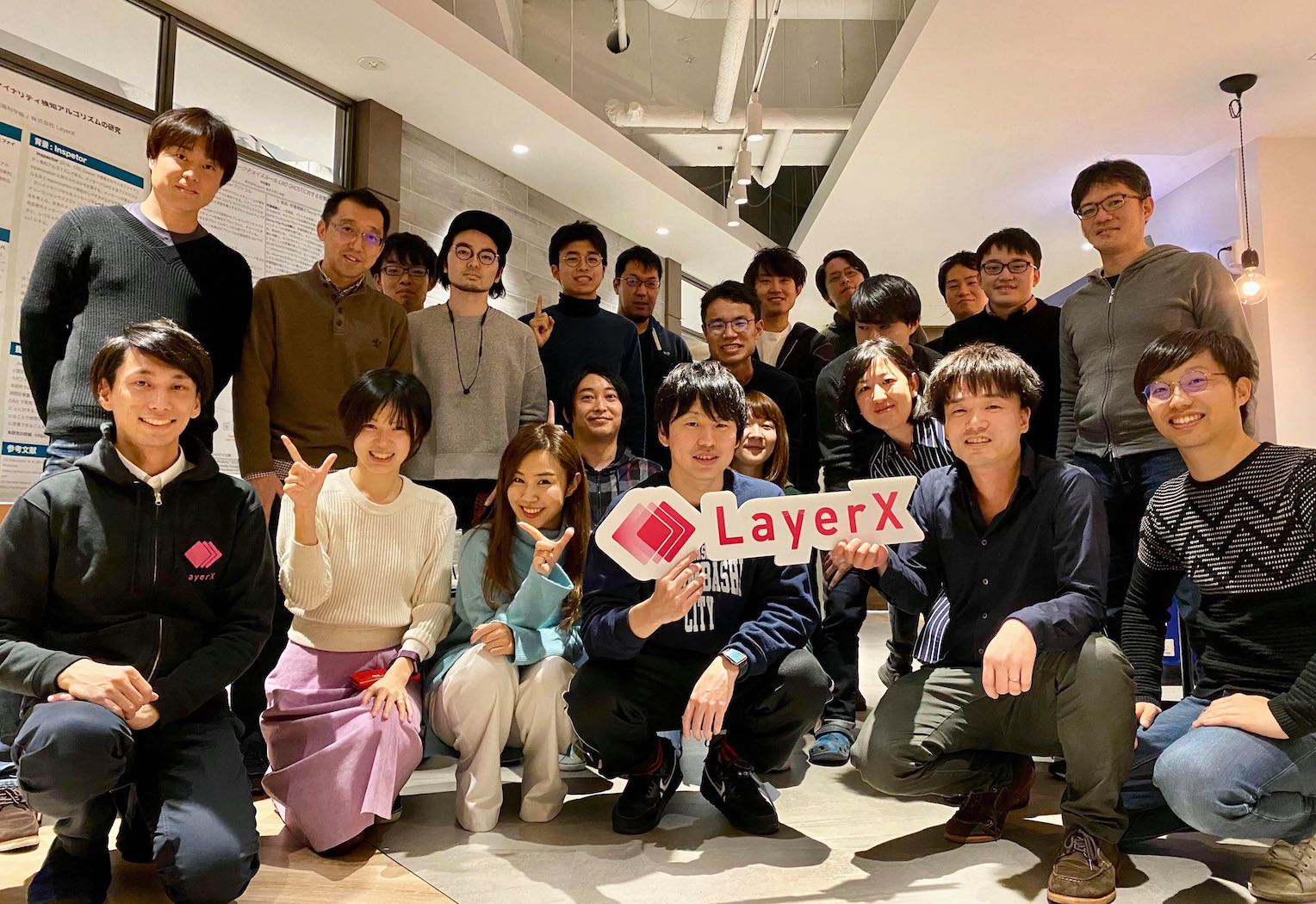
Image provided by:LayerX
Interview and text: Yuki Harada (Qonversations) Photography: Daisuke Okamura
LayerX
With “digitalize all economic activity” as its mission statement, LayerX promotes DX (Digital Transformation) in a wide range of industries led by the financial sector, and with a focus on blockchain technologies. At present, the team of about 30 members headed by representative Yoshinori Fukushima aims to transform credit and assessment as we know them. They work to do this by reducing friction during economic activity, in order to allow more people and companies to receive its benefits. LayerX moved to an office in the Nihonbashi area in November 2019.
